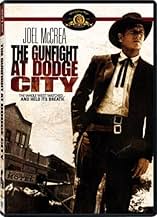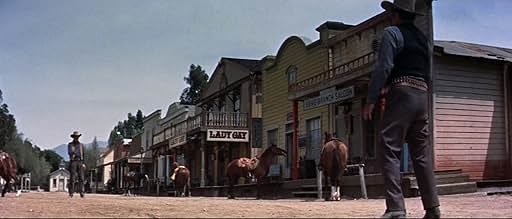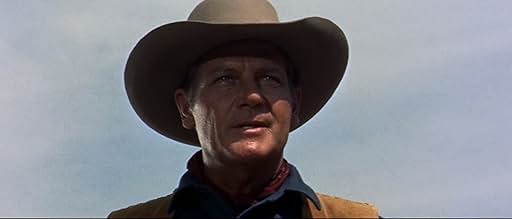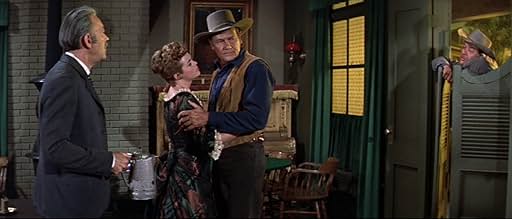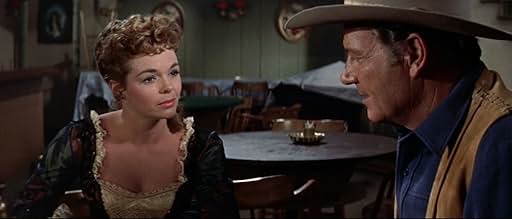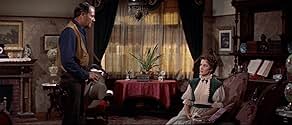IMDb RATING
6.2/10
1.2K
YOUR RATING
After his brother the sheriff is murdered, Bat Masterson is elected to the job and is determined to find the killer and make Dodge City safe.After his brother the sheriff is murdered, Bat Masterson is elected to the job and is determined to find the killer and make Dodge City safe.After his brother the sheriff is murdered, Bat Masterson is elected to the job and is determined to find the killer and make Dodge City safe.
- Director
- Writers
- Stars
Abdullah Abbas
- Barfly
- (uncredited)
Fred Aldrich
- Townsman
- (uncredited)
Emile Avery
- Barfly
- (uncredited)
Rayford Barnes
- Corporal
- (uncredited)
Gregg Barton
- Townsman
- (uncredited)
John Barton
- Barfly
- (uncredited)
Rudy Bowman
- Townsman
- (uncredited)
- Director
- Writers
- All cast & crew
- Production, box office & more at IMDbPro
6.21.1K
1
2
3
4
5
6
7
8
9
10
Featured reviews
A Question of Honor
My vote has always been that of all the great stars identified as western heroes, none was more upright than Joel McCrea. In fact whenever he tried to vary that character, the results usually weren't that good. Even in comedy parts like his films with Preston Sturges, he's still an honorable man, albeit caught up in some lunacy.
McCrea never crossed the line into making himself look ridiculous like Dudley Doo-Right and The Gunfight at Dodge City is a case in point. Here he's playing Bat Masterson who has come into Dodge City after a killing in another town and buys an interest in the Lady Gay Saloon owned by widow Nancy Gates. Brother Ed Masterson, played by Harry Lauter is the town marshal and he's keeping company with preacher's daughter played by Julie Adams.
Brother Ed is shot in the back during a cowboy hurrahing of Dodge City and Bat steps in to take his place. He brings some law and order back to Dodge City and makes both friends and enemies in the process. And he's got both the women mentioned before interested in him.
Fate would have it, a friend from another town comes back in his life. He wants him to bust his brother, who's mentally retarded, out of custody. The brother has killed a man who was making fun of him. He owes this guy big time and he has a responsibility to his badge in Dodge City.
I won't say anything, but Joel McCrea never took the less honorable route in his cinematic career. And as for which woman he winds up with? See the film.
Also look for an unusual performance against type from Richard Anderson. Anderson usually plays nice guys and he's best known for being Lee Majors boss in the Six Million Dollar Man. He's a serpentine villain here and a good one.
I saw this when I was 12 years old when it was the second feature of a double bill. That's what McCrea westerns were relegated to at that time. But Joel McCrea was a real cowboy hero to this 12 year old.
Still is.
McCrea never crossed the line into making himself look ridiculous like Dudley Doo-Right and The Gunfight at Dodge City is a case in point. Here he's playing Bat Masterson who has come into Dodge City after a killing in another town and buys an interest in the Lady Gay Saloon owned by widow Nancy Gates. Brother Ed Masterson, played by Harry Lauter is the town marshal and he's keeping company with preacher's daughter played by Julie Adams.
Brother Ed is shot in the back during a cowboy hurrahing of Dodge City and Bat steps in to take his place. He brings some law and order back to Dodge City and makes both friends and enemies in the process. And he's got both the women mentioned before interested in him.
Fate would have it, a friend from another town comes back in his life. He wants him to bust his brother, who's mentally retarded, out of custody. The brother has killed a man who was making fun of him. He owes this guy big time and he has a responsibility to his badge in Dodge City.
I won't say anything, but Joel McCrea never took the less honorable route in his cinematic career. And as for which woman he winds up with? See the film.
Also look for an unusual performance against type from Richard Anderson. Anderson usually plays nice guys and he's best known for being Lee Majors boss in the Six Million Dollar Man. He's a serpentine villain here and a good one.
I saw this when I was 12 years old when it was the second feature of a double bill. That's what McCrea westerns were relegated to at that time. But Joel McCrea was a real cowboy hero to this 12 year old.
Still is.
Bat into the hell of Dodge City
Joel McCrea, one of my favorite actors ever, especially in Westerns, delivers yet another naturalistic, honest, completely unpretentious and honorable performance in THE GUNFIGHT AT DODGE CITY, playing the famous Bat Masterson, born in Quebec, Canada in 1853 and deceased in NY in 1921, in between doing plenty of different jobs, from sheriff and marshall involved in noteworthy shootouts - mainly in Dodge City - to professional hunter, gambler, journalist, US Army scout, among other occupations.
As Bat not out of, but into the hell of Dodge City, McCrea receives able assistance from John McIntire as the town doctor - very unlike Doc Holiday's relation with Wyatt Earp, no rasping cough for starters - and he dispatches in style duplicitous villain Rudabaugh, portrayed against type by Richard Anderson, better known for roles in TV productions.
Two females interested in McCrea: the extremely beautiful Julie Adams, and the not so conventionally pretty but kindhearted and loving Nancy Gates. Bat has his hands full but makes the right choice!
I do not know much about Director Joseph Newman. I liked his A THUNDER OF DRUMS more than THE GUNFIGHT but enjoyed it despite the poor copy and unremarkable cinematography by Carl Guthrie.
The screenplay by Daniel Ullman rates somewhat patchy. 7/10.
As Bat not out of, but into the hell of Dodge City, McCrea receives able assistance from John McIntire as the town doctor - very unlike Doc Holiday's relation with Wyatt Earp, no rasping cough for starters - and he dispatches in style duplicitous villain Rudabaugh, portrayed against type by Richard Anderson, better known for roles in TV productions.
Two females interested in McCrea: the extremely beautiful Julie Adams, and the not so conventionally pretty but kindhearted and loving Nancy Gates. Bat has his hands full but makes the right choice!
I do not know much about Director Joseph Newman. I liked his A THUNDER OF DRUMS more than THE GUNFIGHT but enjoyed it despite the poor copy and unremarkable cinematography by Carl Guthrie.
The screenplay by Daniel Ullman rates somewhat patchy. 7/10.
Entertaining and busy movie
This is a fine western movie that moves along at a fast-pace. The dialog is often embarrassingly funny,as these characters were practical people here ! This is an oddly memorable film with all sorts of interesting details. The nightly,rowdy frontier-town scenes are great,with very dangerous but often very funny drunken behavior that is delivered in spades by the residents and visitors who are seemingly in the bars/casinos 24/7.
I won't tell you that this is a 'masterpiece theater of the west',but it is definitely a pretty good movie and it is a little different from many if not most of the western-themed movies of the era.
I liked it,it gets an easy 90/100 in my book.
I won't tell you that this is a 'masterpiece theater of the west',but it is definitely a pretty good movie and it is a little different from many if not most of the western-themed movies of the era.
I liked it,it gets an easy 90/100 in my book.
Decent western with romance , action and gun-play
It deals with the gun-down that cracked the West wide open , as Bat Masterson (Joel McCrea) doesn't look for problems , but he doesn't walk away from it . When an army sergeant in Hays City attempts to shot Bat and dies for this attack , Bat heads for Dodge City where Ed , his brother , is city marshal and a candidate for county sheriff running against the nasty Regan (Don Haggerty) . While Masterson buys a share in a local saloon called ¨Lady gay¨ , partnering with the widow Lily (Nancy Gates) . Then , after an ambush carried out by the corrupt Dave Rudabaugh (Richard Anderson) , Bat , helped by a fine Doctor (John McIntire) , finds himself a candidate for sheriff and the heir to Ed's intentions toward Pauline (Julie Adams) , a minister's daughter . As Bat Masterson is elected to the job and is determined to find the killer and to maintain law and order and make Dodge City safe.
Better than average Western with Joel McCrea as the famous gunman and gambler Bat Masterson . As it stars Joel MacCrea who performed lots of Westers as ¨Unión Pacific¨, ¨Buffalo Bill¨ , ¨the Virginian¨, ¨Ramrod¨, ¨South of St Louis¨ , ¨4 faces West¨ , ¨The Oklahoman¨ and his final classic ¨Ride the high county¨ along with Randolph Scott . It contains a good cast as John MacIntire as a good Doctor , Richard Anderson , Don Haggerty , Timothy Carey , James Westerfield as reverend and two gorgeous girls : Julia Adams and Nancy Gates who previously played opposite a different Bat , George Montgomery , in the Western ¨Masterson of Kansas¨ . The movie is inspired on true events . Thus , Bartholomew ¨Bat¨ Masterson (1853-1921) spent the last twenty years of his life as a popular sports writer on New York newspaper . Previously he had taken part in the battle of Adobe Walls in 1874 in which a small party of hunters beat off a fierce attack by hundreds of Indians , events narrated in the meeting between Bat and the old man at the beginning of the film . In 1878 the marshal of Dodge City was shot by two cowboys , Bat rushed to the scene and gunned down the killer . Bat was appointed as deputy U.S. marshal by the Mayor and shortly after captured noted outlaw . Along with Bat were hired to keep the peace as lawman Wyatt Earp and Bill Tilghman . In 1902 he settled in N.Y.City and became a successful sports writer on the Morning Telegraph and he died at his desk from a heart attack . Masterson said he has not killed as many men as was popularly supposed though he had experienced a great many difficulties . The picture is set in Dodge City , Kansas , the most celebrated of the cowboy cattle towns , became a major railhead cowtown for the cattle driven up from Texas over the long trails , during the cattle boom Dodge shipped more than 250.ooo head a year . The free-spending cowboys attracted professional gamblers , badmen , saloon and brothel keepers and became a rough town in the best traditions of the wild west . Dodge City reigned as ¨Queen of the Cowtowns¨ until final XIX century when the free range cattle industry came to an end .
The film is an enjoyable western and well written by Martin Goldsmith based on a story by Daniel Ullman . Agreeable and evocative musical score by Hans J. Salter . Colorful and glimmer cinematography by Carl E. Guthrie . Production is in charge of Walter Mirish , an usual western producer: the Magnificent Seven saga . The motion picture was rightly directed by Joseph M. Newman . Joseph made all kinds of genres : drama , thrillers as ¨King of the roaring¨, ¨The story of Arnold Rothstein¨, ¨Love nest¨, ¨Great Dan Patch¨ , ¨Jungle Patrol¨ and a classic Sci-Fi : ¨The Island Earth¨. The flick will appeal to western moviegoers.
Better than average Western with Joel McCrea as the famous gunman and gambler Bat Masterson . As it stars Joel MacCrea who performed lots of Westers as ¨Unión Pacific¨, ¨Buffalo Bill¨ , ¨the Virginian¨, ¨Ramrod¨, ¨South of St Louis¨ , ¨4 faces West¨ , ¨The Oklahoman¨ and his final classic ¨Ride the high county¨ along with Randolph Scott . It contains a good cast as John MacIntire as a good Doctor , Richard Anderson , Don Haggerty , Timothy Carey , James Westerfield as reverend and two gorgeous girls : Julia Adams and Nancy Gates who previously played opposite a different Bat , George Montgomery , in the Western ¨Masterson of Kansas¨ . The movie is inspired on true events . Thus , Bartholomew ¨Bat¨ Masterson (1853-1921) spent the last twenty years of his life as a popular sports writer on New York newspaper . Previously he had taken part in the battle of Adobe Walls in 1874 in which a small party of hunters beat off a fierce attack by hundreds of Indians , events narrated in the meeting between Bat and the old man at the beginning of the film . In 1878 the marshal of Dodge City was shot by two cowboys , Bat rushed to the scene and gunned down the killer . Bat was appointed as deputy U.S. marshal by the Mayor and shortly after captured noted outlaw . Along with Bat were hired to keep the peace as lawman Wyatt Earp and Bill Tilghman . In 1902 he settled in N.Y.City and became a successful sports writer on the Morning Telegraph and he died at his desk from a heart attack . Masterson said he has not killed as many men as was popularly supposed though he had experienced a great many difficulties . The picture is set in Dodge City , Kansas , the most celebrated of the cowboy cattle towns , became a major railhead cowtown for the cattle driven up from Texas over the long trails , during the cattle boom Dodge shipped more than 250.ooo head a year . The free-spending cowboys attracted professional gamblers , badmen , saloon and brothel keepers and became a rough town in the best traditions of the wild west . Dodge City reigned as ¨Queen of the Cowtowns¨ until final XIX century when the free range cattle industry came to an end .
The film is an enjoyable western and well written by Martin Goldsmith based on a story by Daniel Ullman . Agreeable and evocative musical score by Hans J. Salter . Colorful and glimmer cinematography by Carl E. Guthrie . Production is in charge of Walter Mirish , an usual western producer: the Magnificent Seven saga . The motion picture was rightly directed by Joseph M. Newman . Joseph made all kinds of genres : drama , thrillers as ¨King of the roaring¨, ¨The story of Arnold Rothstein¨, ¨Love nest¨, ¨Great Dan Patch¨ , ¨Jungle Patrol¨ and a classic Sci-Fi : ¨The Island Earth¨. The flick will appeal to western moviegoers.
No cane and derby hat here.
Absent from this film are Wyatt Earp, Masterson's close friend and colleague in Dodge City, and Masterson's dapper clothing, a lifelong trademark, two major flaws in the film. His avoidance of public office doesn't ring true, either. The plot itself takes considerable liberties with the truth. (The television series "Bat Masterson" was closer to the truth in spirit and sometimes in fact.)
However, McCrea's intelligent and introspective portrayal of Masterson is on the mark. The acting of him and the rest of the cast carry the film, which is saddled with uninspired direction.
However, McCrea's intelligent and introspective portrayal of Masterson is on the mark. The acting of him and the rest of the cast carry the film, which is saddled with uninspired direction.
Did you know
- TriviaThe gunfight in the saloon is based on an actual gunfight that took place in the Lady Gay Saloon in Sweetwater, Texas on January 24th, 1876. The shootout involved Bat Masterson, a soldier known as Sergeant Melvin A. King (who was in reality a Corporal) and a woman named Mollie Brennan. King's character in this movie was Sgt. Ernie King, played by Charles Horvath and Mollie Brennan's character was Mollie Day, played by Kasey Rogers.
- GoofsThe man who bought Bat's saloon is Ben Townsend. After changing the marquee from Masterson's name it says "Ben Thompson's".
- Quotes
Doc Sam Tremaine: They say you deal blackjack with three fingers: thumb, index and trigger.
- ConnectionsReferenced in The Exiles (1961)
- How long is The Gunfight at Dodge City?Powered by Alexa
Details
- Runtime
- 1h 21m(81 min)
- Aspect ratio
- 2.35 : 1
Contribute to this page
Suggest an edit or add missing content


